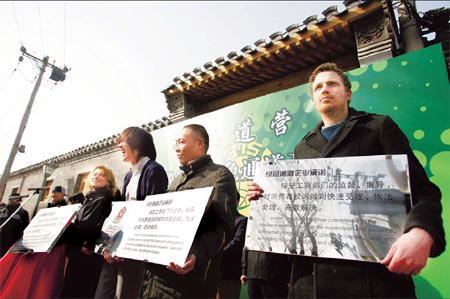Money
Diners are choking on the fees for chopsticks
By Wu Yiyao (China Daily)
Updated: 2010-03-15 09:43
 |
Large Medium Small |
|
 Representatives of companies in Wudaoying Hutong receive tablets vowing fair practices on Saturday, ahead of Monday's Consumer Rights Day. Zou Hong / China Daily |
Restaurants that charge diners for tableware are violating consumers' rights, according to an open letter published on Sunday that was penned by a cartel of powerful advocacy groups, including ones from the capital.
The letter, that was signed by consumers' associations from 21 cities and the China Consumers Journal, said restaurants are obliged to provide free, clean and safe tableware under the terms of the Food Safety Law and Consumer Rights Protection Law.
The cost of providing clean and safe tableware should not be transferred to consumers because that would mean restaurants would ordinarily offer a low standard of service that violate consumers' rights, the open letter claimed.
Xiao Min, a 47-year-old frequent diner from Chaoyang district, said he has paid extra for sterilized tableware for many years and has never quibbled.
"I thought it was unreasonable to pay to use cutlery in a restaurant," Xiao said. "However, I did not argue with the restaurants because I didn't want to make a fuss about such a small charge, especially when my guests were around."
An employee from a Korean barbecue restaurant in Wudaokou, Haidian district, said her employer provides a choice of either free disposable chopsticks or sterilized chopsticks for 1 yuan.
"Consumers have rarely told me the charge was unfair," Li said. "Usually, they will choose the 1-yuan sterilized chopsticks."
A manager, surnamed Wang, from a Northeastern Chinese cuisine restaurant in Chaoyang, said her employer charges 1.5 yuan for a sterilized tableware set that comprises a bowl, plate, spoon, chopsticks and napkin.
In 2008, the restaurant was sued for not notifying customers about the extra charge.
"We now still charge consumers but we always remember to notify them about it," Wang said.
However, the writers of the open letter said the issue of whether customers are told about the fee is moot because the charge is essentially compulsory.
"I was actually forced to pay," said Song Hongshan, a 26-year-old diner from Chaoyang district. "Can I refuse to pay and eat without chopsticks and a plate?"
Li Zao, a manager at a cutlery sterilization company, said restaurants usually pay 0.8 yuan to get a set of tableware sterilized.
A restaurant employee, who asked to remain anonymous, said that without the fees, customers would have less choice.
"If charging a tableware sterilization fee is forbidden, we will give consumers disposable tableware that are much cheaper than sterilized ones, as we did before," the worker said.







